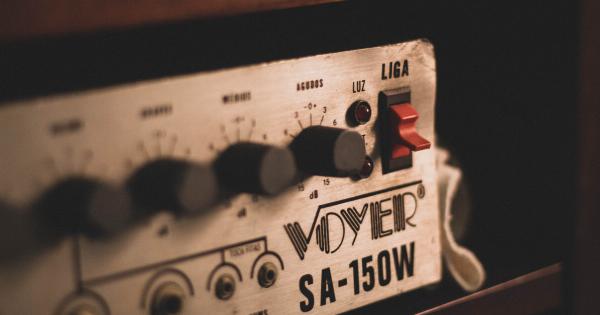Music has always had a powerful impact on humans. It has the ability to touch our hearts, uplift our spirits, and bring us together. But music does much more than just entertain us; it has healing properties that can positively affect our minds and souls.
In this article, we will explore the incredible power of music as a healing force.
The Science Behind Music’s Healing Power
It is widely accepted that music has a significant impact on our emotions and overall well-being.
But what is the science behind it? Research has shown that music can directly affect the brain, stimulating various regions responsible for processing emotions and releasing chemicals such as dopamine, oxytocin, and endorphins. These chemicals are known as “feel-good” hormones and play a crucial role in reducing stress, anxiety, and even physical pain.
Additionally, listening to music can trigger memories and nostalgia, taking us back in time and evoking powerful emotions.
This ability to transport us to different moments of our lives can be incredibly therapeutic, helping us process and heal from past traumas or difficult experiences.
The Therapeutic Benefits of Music
Music therapy has gained recognition and popularity over the past few decades as a legitimate form of treatment for various conditions and disorders.
Trained music therapists use music deliberately to improve cognitive function, emotional well-being, and overall quality of life for individuals of all ages.
1. Reducing Stress and Anxiety
One of the most significant benefits of music therapy is its ability to reduce stress and anxiety.
Listening to soothing music or engaging in playing musical instruments has been shown to lower cortisol levels, decrease blood pressure, and promote relaxation. Many individuals find solace in turning to their favorite melodies during times of stress or when seeking moments of tranquility.
2. Enhancing Cognitive Abilities
Music has a profound impact on our cognitive abilities. Studies have found a positive correlation between musical training and enhanced cognitive skills, particularly in the areas of attention, memory, and problem-solving.
Playing an instrument, for example, requires coordination between different regions of the brain, leading to improved neural connections and overall brain function. These cognitive benefits extend to individuals of all ages, including children and older adults.
3. Managing Depression and Mood Disorders
Depression and mood disorders can be debilitating, impacting every aspect of an individual’s life. However, music therapy has shown great promise as an adjunct therapy for managing these conditions.
Music has the power to evoke emotions and improve mood, serving as a form of self-expression and providing an outlet for emotional release. Participating in group music therapy sessions can also foster a sense of connection and support among individuals facing similar challenges.
4. Facilitating Physical Rehabilitation
Music therapy has proven to be effective in physical rehabilitation settings. It can help individuals regain motor skills, improve coordination, and enhance overall physical functioning.
Rhythmic cues provided by music can assist in the relearning of movements and help individuals regain their mobility and independence. Additionally, music can distract patients from pain and discomfort, making the rehabilitation process more bearable.
5. Promoting Sleep and Relaxation
Many individuals struggle with sleep disorders or have difficulty falling asleep due to stress and anxiety. Music therapy can aid in promoting better sleep quality and relaxation.
Slow, calming melodies can lower heart rate and induce a state of tranquility, helping individuals drift off more easily. White noise, nature sounds, or soothing instrumental music are often recommended for creating a peaceful sleep environment.
6. Fostering Emotional Well-being
Emotional well-being is essential for maintaining a healthy mind and soul. Music has an extraordinary ability to evoke emotions and create a safe space for individuals to explore and process their feelings.
Whether it’s through listening, writing, or creating music, this art form can serve as a powerful tool for self-reflection, emotional release, and personal growth.
7. Boosting Immune System
Research has found that listening to music can boost the immune system’s function. The positive effects of music on stress reduction and emotional well-being directly contribute to a stronger immune response.
When our bodies are in a relaxed state, our immune systems can function optimally, protecting us from illnesses and promoting overall health.
The Universal Language of Music
Music transcends language, culture, and boundaries. Regardless of our background or beliefs, music has the power to unite and connect us on a deep, emotional level.
It can serve as a form of therapy for the soul, providing solace, comfort, and a means of self-expression.
The Role of Music in Society
Throughout history, music has played a vital role in society. It has been used to celebrate, commemorate, and communicate.
In times of crisis or tragedy, music has brought communities together, providing a collective space for healing, understanding, and resilience. From religious rituals to social gatherings, music has been an integral part of human culture, influencing our thoughts, emotions, and actions.
The Future of Music Therapy
As our understanding of the power of music continues to grow, so does the potential of music therapy as a formal form of treatment.
The field of music therapy is constantly evolving, with ongoing research and discoveries expanding its applications and benefits. From hospitals and rehabilitation centers to schools and mental health facilities, music therapy is being integrated into various settings to enhance the well-being and quality of life for individuals of all ages.
Conclusion
Music is more than just entertainment; it is a healing force for the mind and soul. Whether through active participation or passive listening, music has the remarkable ability to uplift our spirits, reduce stress, and promote emotional well-being.
Its therapeutic benefits extend to cognitive function, physical rehabilitation, and sleep enhancement. As we continue to unlock the mysteries of the human brain and its connection to music, the healing power of this universal language will only become more profound.































